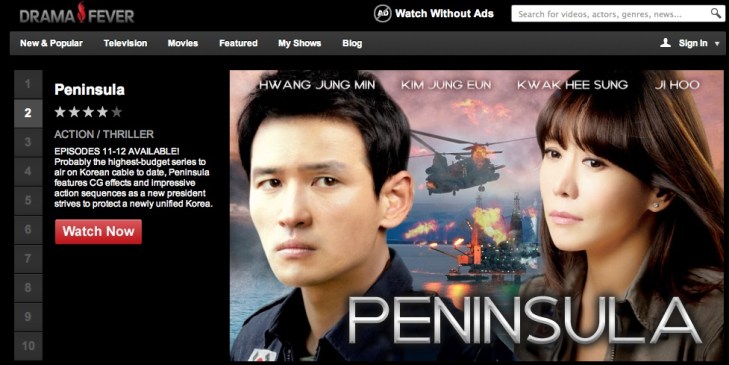DramaFever wants to build a site where North American audiences can watch TV from around the world, and it has won the support of some key figures from YouTube’s past.
The company just announced that it has raised $4.5 million in Series B funding. The round was led by MK Capital, a firm whose portfolio also includes Movieclips and popular gaming video site Machinima. YouTube’s co-founder Steve Chen and Benjamin Ling (a product manager at Google who was YouTube’s director of partnerships, content, and platforms from 2008 to 2010) also invested, as did Stubhub founder Jeff Fluhr, GraphEffect president Stephano Kim, Wikets CEO Andy Park, and Capital IQ co-founders Randy Winn and Steve Turner.
Co-founder Seung Bak says he became convinced there might be a business here when he saw the online fan communities that built up around Asian TV shows, even though they weren’t even available legally in the United States. So he made a few licensing deals (DramaFever programs are subtitled in English and can be streamed in the United States and Canada) and launched a “very simple” version of the site in August 2009. Now DramaFever has the rights to more than 400 titles from 60 media companies in seven countries.
Viewers can watch the shows with ads, or pay a $10-per-month subscription fee to get rid of them. DramaFever claims to have 1.5 million monthly visitors who watch the free shows, as well as 15,000 subscribers. Right now, the programming comes from Asian countries. Bak says that for some viewers, it replaces the stack of VHS tapes purchased at an Asian supermarket. (As the child of Chinese parents, I can definitely relate to this.) At the same time, he says the shows aren’t just of interest to Asian Americans — in fact, 75 percent of DramaFever’s visitors are not of Asian descent.
DramaFever has operated at or near break-even levels for most of its history. With this funding, Bak says the company can get a little more aggressive. One goal is to expand the programming beyond Asia, to include Latin American telenovelas, Bollywood movies, and more. Another is to get DramaFever on more mobile and connected TV platforms (it’s currently available on Roku, and there’s a version of the site that’s optimized for iPad).
Bak positions DramaFever as part of the second wave of online video, which goes beyond the user-generated content of sites like YouTube and is more focused on bringing things like Hollywood movies and prime-time TV to the Web. Of course, that second wave has had its challenges, with sites like Netflix and Hulu struggling with rising licensing fees. Bak admits that DramaFever can’t escape those problems — “Content is definitely getting more expensive” — but it should have an easier time, since it’s opening up entirely new revenue streams for its partners, rather than competing for the same audience.
